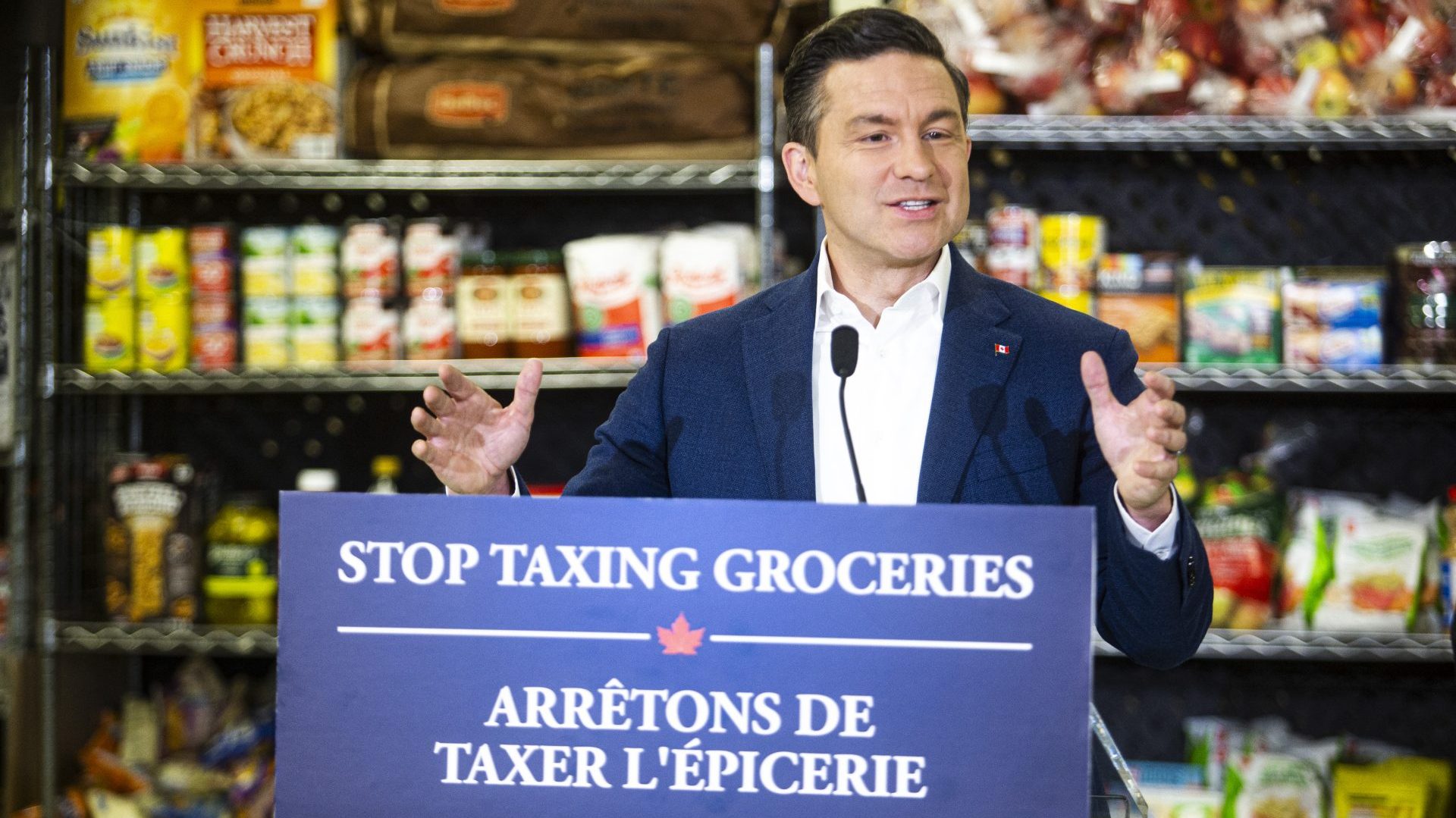Conservatives seize on Liberals’ ‘law-and-order vacuum’ as Trump anxiety wanes, but ‘MAGA North’ comparisons still a concern, say strategists

The Conservative Party is attempting to fill the “law-and-order vacuum” as Canadians’ concerns over the economy and crime begin to overtake the worry about threats from the American president that dominated the last general election, say politicos. But one progressive strategist notes that United States President Donald Trump is “not going anywhere” anytime soon, and the official opposition is still vulnerable to accusations that it’s trying to cultivate “MAGA North.”
“There’s going to be ebbs and flows, but a lot of Canadians are still very concerned about Trump and tariffs,” said Matt Chilliak, who has worked for progressive candidates on both sides of the border, including for the federal NDP and provincially in Saskatchewan and British Columbia, as well as for American Democratic campaigns during the 2020 election cycle, and as a director for a political action committee in 2024.
“Trump isn’t suddenly going to become a friendly player to Canadian interests, and there’s still another three-and-a-half years, God willing,” Chilliak said, pointing to Trump’s musings on running for an additional third term. “The lesson for the Conservatives from the last election should have been to shelve anything that helps those comparisons, but it increasingly seems it’s the opposite.”
Although there’s still an overall Grit lead, recent polling from Abacus Data and the Angus Reid Institute suggests the Conservatives are either tied with or leading the governing Liberals.
In an Angus Reid survey published on Sept. 23, the Conservatives held a three-point lead over the Liberals, 41 per cent to 38 per cent, due in part to a mixed reaction to Prime Minister Mark Carney’s (Nepean, Ont.) initial list of major national projects, and the negative perception of the action his government has taken to address immigration levels, government spending, and housing affordability.

Abacus Data’s Sept. 21 survey also found that while the cost of living (57 per cent), the economy (37 per cent), and housing affordability (34 per cent) continue to dominate as Canadians’ central issues, the concern over crime and public safety has risen by four points in just over two weeks to 20 per cent, while worries over Trump have fallen from the mid 40s during the election to 34 per cent.
Nanos Research’s national issue tracking also demonstrates a similarly significant drop for worries about the U.S. president, down from the top issue at 41 per cent at the beginning of April to just 12.4 per cent as of Sept. 26, while “jobs and the economy” has remained steady at just below 20 per cent.
Ashton Arsenault, vice-president at Crestview Strategy and a former ministerial staffer in the Harper government, told The Hill Times that alongside the Conservatives’ criticisms of the Liberals’ attempts to address housing, the cost of living, and government spending, there is a large political void on crime and public safety that the opposition is more than happy to fill.

“The Carney government has definitely been a little more ambitious and moved faster on some of those issues compared to the Trudeau government, but there is still a big law-and-order vacuum,” explained Arsenault.
Of the 19 pieces of legislation the Conservatives have put forward in the House since the election, 12 are primarily focused on crime or changes to the Criminal Code, including Bill C-242, the Jail not Bail Act, and private members’ bills focused on victims’ rights, parole review, and intimate partner violence.
Arsenault said that while some may frame the focus as a return to the “red meat” social issues that energize the Conservative base, he instead views it as responding to the increasing appetite among the majority of Canadians for “justice and an end to the persistent lawlessness on Canadian streets.”
“This is less of a social issue and more about what society deems as right and wrong, and I don’t know how many more examples of these exceptionally violent offenders committing heinous crimes while on bail that need to hit the headlines or the news reels before something actually gets done about it,” he said.
Arsenault said the Liberals received somewhat of a “free pass” following the election and into the summer as Conservative Leader Pierre Poilievre (Battle River–Crowfoot, Alta.) focused on winning his August byelection. However, with Poilievre’s return to the House, the pressure will only increase.
Conservative strategist Cole Hogan said that the focus on crime is an especially effective issue for the party as it is not only one of the few issues the Liberals have yet to address meaningfully, but it is also one of the main issues on which the Conservatives have retained the most trust from Canadians.

According to the Abacus survey, 66 per cent of respondents indicated that the Conservatives were the best party to address crime and public safety, compared to just 17 per cent who said the Liberals were best placed.
“If you’re someone who is immersed in American news or social media, Trump might still be omnipresent for you, but if you’re going about your day to day in any major city in Canada, what you’re seeing is crime and addiction,” Hogan said. “It makes total sense for the Conservatives to stake out this position because that’s where Canadians are at, and the Liberals will have to play defence on why they haven’t done anything to address it.”
In early September, prior to Parliament’s return, Carney told reporters that his government would table a bail-reform bill this fall, putting it on the agenda alongside the Liberals’ recently introduced anti-hate legislation, and plans to address intimate partner violence, and online exploitation.
During the spring election campaign, Carney said the Liberals would tighten bail laws for individuals accused of home invasion, car theft, and violent or organized crime.
Speaking with reporters on Sept. 10, Justice Minister Sean Fraser (Central Nova, N.S.) said the government is aiming to table the bail reform legislation in October.
“It’s important that we not only advance these measures to improve the public safety outcomes for communities, but … ensure that people actually have faith in the justice system,” Fraser said, adding that the Liberals are willing to work with the Conservatives “if they are willing to work alongside us to advance reforms that will help keep communities safe without necessarily aiming solely to gin up dissent for a political purpose.”
However, Arsenault and Hogan said that introducing legislation and making a compelling case to Canadians regarding its efficacy are two separate things, and Carney’s ministers have not demonstrated a high level of aptitude in the latter.
As one example, Hogan pointed to Public Safety Minister Gary Anandasangaree (Scarborough–Guildwood–Rouge Park, Ont.) “blowing up” the Liberals’ introduction of the gun buyback program pilot before it even happened after an audio recording of a private conversation was released online in which the minister cast doubt on his confidence in the program.
“If you’ve got ministers doing double-speak and admitting to doing things they don’t believe in, that’s going to hurt whatever credibility the Liberals have left,” Arsenault explained. “And if ministers are going to keep making mistakes, that’s going to add up and test whether or not this government’s in it for the long haul.”
Hogan said that while Carney is most comfortable addressing his international agenda, “the prime minister of Canada is ultimately going to be judged on domestic issues.”
“Carney likes to do the jet-setting international stuff, but he is either going to have to start deploying his ministers more effectively at home, or start handling these domestic issues himself,” Hogan said.
However, both Ashton and Hogan noted that the Conservatives need to remain vigilant and not get distracted by the more fringe issues.
As one recent example, both noted the focus some Conservative MPs have given in support of the ostrich farm in B.C. that is currently embroiled in a dispute with the Canadian Food Inspection Agency over a planned cull of its more than 300 birds due to avian flu. Other prominent right-wing supporters of the farm include Robert F. Kennedy Jr., the U.S. secretary of health and human services.
“I would prefer if no one brought up the ostriches because it’s, quite frankly, one of the dumbest stories I can recall,” Arsenault explained, adding that—thankfully, he said—Poilievre has yet to wade in.
Hogan said that there will always be segments of any party’s base that will inevitably get excited over one issue or another, no matter how niche, and will put pressure on their local MPs to speak out, but advised the Conservatives to maintain some level of message discipline.

While the Conservatives seem less concerned about comparisons to Trump or the Republican Party since the election, Chilliak said three-and-a-half years is a long time to hope the president stays quiet.
“The concern over Trump may have receded slightly, but it won’t take much for him to ramp it back up,” Chilliak said. “And from what we know about Trump, there’s no predicting when that will be, what it will be on, and just how crazy the issue that it’s going to be on is going to be.”
While Chilliak said he’s confident Poilievre will easily pass his leadership review in January 2026, he will remain in a difficult position so long as Trump remains a concern for a large swath of Canadians, while at the same time enjoying support from a significant number of Conservative supporters.
Additionally, while Poilievre himself will be vulnerable to comparisons with Trump, his tenure as leader has also been buoyed by a significant number of supporters who like that comparison.
“There’s always been a split between the small-c progressive conservatives and the further-right Reform side, but currently, you can argue that Reform is winning,” Chilliak explained. “They may have retreated somewhat under Harper’s minority governments and had to moderate many of their positions, but I don’t know if the moderates will be able to do the same for long.”
“They may want those moderates to think Trump is going to go away and the comparisons will stop, but it’s hard to see that side coexist with the side that wants to be MAGA North.”
The Hill Times






 LICENSING
LICENSING PODCAST
PODCAST ALERTS
ALERTS












